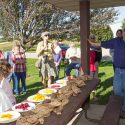Year of the Humanities events continue into spring
Languages, literary fame, poetry, filmmaking and the supernatural are topics included in the programming lineup for the spring semester of the Year of the Humanities at the University of Wisconsin–Madison.
Free public lectures, panels, performances and a film screening, organized by the Arts and Humanities Strategic Planning Council, will explore the latest in what is new and exciting in humanities thought, teaching and research. The semester’s programs follow the successful roster of events from the fall semester. The goal for the Year of the Humanities is to raise the profile of the humanities by showing what the humanities are and how they enrich our lives.
A special Year of the Humanities was developed because the 2009-10 academic year marks anniversary milestones for many humanities organizations on campus: 50th for the Institute for Research in the Humanities; 40th of the Gaylord Nelson Institute for Environmental Studies; 10th for the Center for the Humanities and the Visual Culture Studies Initiative; and fifth for the Language Institute.
Steven Nadler, chair of the Department of Philosophy and William H. Hay II Professor of Philosophy, is co-chair of the council, along with Susan Zaeske, chair of the Department of Communication Arts. Council members include representatives from arts and humanities departments in the College of Letters & Science, as well as from departments in the social sciences and in other schools doing work and research in the humanities, such as the School of Human Ecology and the College of Agricultural and Life Sciences.
“The first semester went well. We had a good turnout at the events and a good balance of public and academic programs,” says Nadler. “There are even more high-profile public events this semester.”
The second round of programs kicks off Wednesday, Feb. 3, with a high-profile public event. A panel of national leaders and scholars in the humanities will discuss “Humanities in the 21st Century.” The panel includes James Leach, chair, National Endowment for the Humanities; Don Randel, president, Andrew W. Mellon Foundation; Pauline Yu, president, American Council of Learned Societies; and Biddy Martin, chancellor, UW–Madison. The panel will be held from 5:30-7 p.m. in Room L160 of the Elvehjem Building, 800 University Ave.
“It’s perfect timing that James Leach, the new chair of the National Endowment for the Humanities, will be here,” says Nadler.
“Jim Leach, Don Randel and Pauline Yu are among the most important leaders in the humanities. The organizations that they head sustain and transform humanistic teaching and research at all levels, from individual scholarly projects to institutional initiatives,” says Sara Guyer, director of the Center for the Humanities. “I imagine that at some point in a career, every major scholar in the humanities has benefited from the Mellon Foundation, the ACLS or the NEH.”
Additional Year of the Humanities events scheduled for February are:
- “Going Digital: A Panel Discussion in the Humanities,” 7:30 p.m., Wednesday, Feb. 10, L160 Elvehjem Building. Panelists will examine the ways in which digitalization has changed the nature of scholarship in the humanities.
- “Language as Homeland,” 10 a.m.-4 p.m. Saturday, Feb. 13, Pyle Center, 702 Langdon St. Linguists estimate that by the end of the next century, fully half of the some 6,000 languages spoken on the planet will be extinct. The day of discussion will center on how communities use native language to create, maintain or regain community in the face of assimilation.
- “The History of English Literature in Six Sonnets,” presented by faculty from the UW–Madison Department of English, 6:30-9 p.m. Tuesday, Feb. 23, Madison Public Library, Central Branch, 201 W. Mifflin St.
- “Symposium on Globalization and the Humanities: Then and Now, Here and There,” Thursday-Saturday, Feb. 25-27, Pyle Center. This 50th anniversary conference of the Institute for Research in the Humanities features three keynote speakers: Natalie Zemon Davis, Anna Tsing and R. Radhakrishnan, as well as panels of institute fellows and UW–Madison faculty and graduate students.
And that’s just February. A similarly robust and exciting program is planned for March and April.
Nadler is especially looking forward to the presentation “Pompeii — Lost and Found?” by Mary Beard, professor of classics at Cambridge University. Her talk, based on her recent book, will examine what kind of town Pompeii was and what we can learn about day-to-day life there, including sex, politics, food, religion, slavery and literacy. Beard’s talk will be held from 7-9 p.m. on Thursday, March 11, at the Elvehjem Building.
Another highlight for Nadler is Elaine Pagel’s presentation of the Chancellor’s Lecture, “The Cultural Impact of the Book of Revelation,” to be held from 7-9 p.m. on Thursday, April 22, at the Elvehjem Building. Pagels is the Harrington Spear Paine Foundation Professor of Religion at Princeton University. Her most recent books include “Beyond Belief: The Secret Gospel of Thomas” (a New York Times bestseller), and “Reading Judas: The Gospel of Judas and the Shaping of Christianity.”
Nadler says it isn’t necessary to be an expert in the topics to enjoy the public events. “The programs assume that people won’t have background in the subject. Attending is a way to hear what’s new and interesting in each field,” he says.
More information on the Year of the Humanities and a complete schedule of all events are available at http://www.humanities.wisc.edu/yearofhumanities.
Tags: events, humanities, outreach


